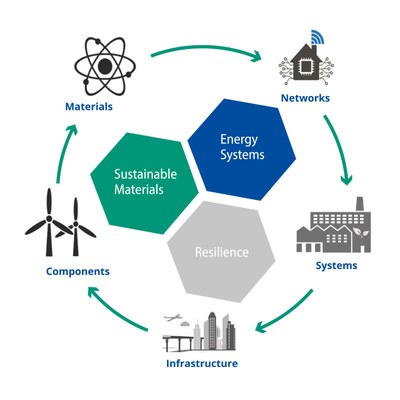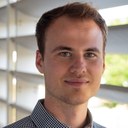Master of Science Sustainable Systems Engineering
The Master's Program
Basic Information
| Total credits: |
120 ECTS (European Credit Transfer and Accumulation System) credits |
| Standard course length: |
4 semester resp. 2 years |
| Language of instruction: |
English, options in German |
|
Course start: |
Winter semester (October), no summer semester entry possible |
Content & Structure
Science and engineering are fundamental tools for achieving a sustainable development, also in domains like ecology, economics and society. The English-taught master's program in Sustainable Systems Engineering (SSE) has an international focus and is designed specifically for graduates holding a bachelor's degree in engineering or natural sciences. The program offers comprehensive engineering expertise in Energy Systems Engineering, Resilience Engineering, and Sustainable Materials Engineering. Additionally, interdisciplinary knowledge in natural resources, climate change, and the intersection of technology and society is also imparted during the two-year program.

Sustainable Systems Engineering is an interdisciplinary program that builds on fundamental knowledge in electrical and mechanical engineering as well as natural and materials sciences.
Starting from the first semester, students have the opportunity to select from a range of Elective Modules within the 3 Technical Concentration Areas, allowing them to specialize in their preferred research field(s) from the beginning.
In addition to the engineering perspective on sustainability, interdisciplinary modules further enrich the holistic understanding of sustainability.
The following areas build the framework for the study program:
- Technical Concentration Areas: Energy Systems Engineering, Resilience Engineering, Sustainable Materials Engineering
- Interdisciplinary Profile
- Master's Section
Special Features of the Master's Program
Internationality & Interdisciplinarity
A key feature of the SSE master's program is the geographic diversity of its students. This remarkable cosmopolitanism provides students with a unique opportunity for intercultural exchange inside and outside of the classroom. Furthermore, the expanding global SSE network is a valuable asset for students as they transition from university to pursue careers around the globe. This diversity also extends to disciplinary backgrounds. Before coming to Freiburg, our students have studied and/or worked in a wide array of fields.
Smart, Micro, Green - Engineering in Freiburg
Smart – stands for robots that act independently, for computers that learn to interpret images or algorithms that become faster and smarter. Simply put, smart stands for computer science.
Micro – is meant literally here. The tiniest technical systems emerge that inconspicuously take on complex tasks in everyday life, medicine and industry. Without even knowing it, you are constantly dealing with microsystems. They make our lives healthier, safer, more comfortable, more versatile and, to say the least, easier.
Green – Freiburg is known worldwide for being the Green City. Since 2015, the Faculty of Engineering has been active from an engineering perspective with its own department for sustainability research. How can renewable energy be generated, fed into the grid and stored? How do we develop materials and systems that are produced and used in an energy- and resource-efficient way and that can adapt optimally to difficult environmental conditions or disasters?
Studying engineering in Freiburg always means that you benefit from all three areas of research, no matter which area you choose. Smart, micro and green technologies are becoming more and more in demand - acquire the necessary competencies to solve the social and technical questions of the future as engineers and computer scientists!
Application & Admissions
We know applying to university is a lot of work, so we will do everything we can to make it as stress-free as possible. Please read the following information carefully! Also check out our FAQs. If you still have questions afterwards don't hesitate to contact us. But please understand that due to the huge amount of e-mails from prospect students, we cannot answer all e-mails with questions that are already answered on our website.
Application period and deadline
Applications for the following winter semester are possible from March 1st to May 15th. This deadline applies to all (EU and non-EU) applicants, including German citizens. Application deadlines are strictly enforced.
Admission requirements
You are in principle eligible for the M.Sc. SSE if you fulfill the following requirements:
- A Bachelor degree in engineering or science with a total of 180 ECTS and 3 years of duration at least (Asia and MENA regions: usually four years).
- Outstanding performance! The "cut-off grade" of the M.Sc. SSE is 2.5 on a German scale.
- 120 ECTS of your bachelor's degree must be engineering- and natural science-related subjects (at least 120 ECTS in the three fields, 1. Mathematics and Informatics, 2. Chemistry and Physics, 3. Engineering, and in each of these fields at least 30 ECTS). This precondition is usually fulfilled for example by electrical and mechanical engineers, but may also be fulfilled by graduates of similar programs such as environmental engineering, process (chemical) engineering, materials science, and energy engineering. The admission committee will decide about the suitability of your previous degree (i.e. whether or not it has prepared you well) for the M.Sc. SSE.
- Advanced English language skills at the level of B2 on the CEFR (Common European Framework of Reference for Languages)
For details, please read the official selection statute in German or English (courtesy translation) as well as the information on certified copies.
German language skills are not required and we only need the documents listed above! Please do not send or upload any other documents like a CV, a motivation letter, letters of recommendation, photos or certifications. They are not relevant to us and we cannot take them into account in the selection process.
Application process
The application process is carried out by the department and the university itself, so you will apply through our online application portal. To apply for the SSE master’s program correctly, all applicants must complete the online application in full and submit it electronically via the application portal. Uni-assist does not process applications for the master’s program SSE! Applicants will be asked to provide electronic copies of their documents. Documents must be color scans of the original. In the case of translations, the original is the certified translation and the guidelines for certification apply (see attachment). All applications (from EU and non-EU students) are due May 15th, 2024. Application deadlines are strictly enforced.
The application has to be submitted online. Unfortunately, this aspect is not yet noted in our selection statute. All documents have to be provided electronically. We won't accept hard-copy versions of applications or any other documents send via mail. Applications via e-mail are also not possible and will be ignored.
Use our step-by-step guide to get through the application process online.
Further information on the documents needed:
Proof of English proficiency
The required English proficiency level for the SSE master’s program is CEFR B2. The list of accepted language certificates can be found here
Notes:
- We do not accept your proof of English proficiency send from the test center directly to us via mail. Please upload the documents yourself.
- You can only use valid scores. If your scores have an expiration date, please make sure that the scores are at least valid until your enrollment date.
Grading and credit system at the respective university
We use the so-called "Modified Bavarian Formula“ to convert grades earned in countries other than Germany. In order to do so we need specific information about how the grading system in each country works. For this, we need the maximum grade you can get at your university as well as the minimum in order to pass.
We also need information about the credit system (work load & credits) at your university, respectively in your country, in order to transfer your credits into ECTS credits.
Ideal would be a document of your university with an explanation of the grading and credit system. Probably you are not the first one who wants to convert grades given in your country into the German system. Therefore, you will surely find something at your university or at other official institutions. If not, try to explain it as well as possible and hand in your explanation.
What do our students say about SSE?
 |
"The Sustainable Systems Engineering (SSE) course at the University of Freiburg was one of the best decisions of my life. I am fortunate and proud to be the first generation of the SSE family. The study gives you an overview of energy systems, resilience, sustainable materials, and information technologies, where you can choose to specialize according to your direction of interest. With an open mind, I have understood the importance of sustainability and why it should be the focus of today's study for the advancement of the future. So, let us be the change we want to see and unite science, society, and technology to improve the environment and humankind." Ravikiran Basavaraju (PO 2016) |
 |
"SSE has been an exciting journey for me, and this excitement keeps me motivated to learn more. I am proud to be in the first batch of SSE. I like that all the professors are very good at what they do; it seems like a trivial thing to say, but I’ve learned more effectively from these courses than I ever have in the past." Puneeth Jakkula (PO 2016) |
 |
"I would like to tell that the course is really amazing and interesting right now. From the 2nd semester, we get to choose our own specializations and subjects which is quite interesting and it feels like we are customizing our own Master's study. Furthermore, there are many interesting subjects to choose from. I am really loving the course and I also recommended to my friends to apply for this course." Deepak Rupakula (PO 2016) |
|
|
"Full of possibilities to explore and practice sustainability, inspires students with decent cutting-edge knowledge and perspectives." Kuo-I Chang (PO 2016) |
|
|
"After finishing my bachelor’s program, I wanted to take a further step into my education, and applying for a master's program was the step to take. I chose the SSE program at the University of Freiburg because it is a comprehensive program at a renowned university that will greatly enhance my knowledge and academic career. What I like about the program is that it offers multiple disciplines and fields of study all in relation to sustainability, not forgetting to mention that the City of Freiburg is a live representation of that." Ehab Elfeituri (PO 2021) |
|
|
"Thanks to SSE, I had the unique opportunity to explore sustainability from a technical perspective through comprehensive courses covering energy systems, resilience engineering, and material science, while also enjoying interdisciplinary opportunities. Also, the chance to participate in research at the Fraunhofer Institute inspired me to pursue a career in this field." Wonsun Song (PO 2021) |
|
|
„Vor dem SSE Master hatte ich noch einen anderen Master begonnen, der mir aber zu wenig in Richtung Nachhaltigkeit ging. Das ist bei SSE ganz anders, hier wird Nachhaltigkeit nicht nur in der Theorie behandelt, sondern auch durch die Uni und die Stadt Freiburg vorgelebt. Außerdem gibt es durch die Nähe zu den Fraunhofer Instituten sehr viel Kompetenz und Fachwissen, gerade im Bereich Erneuerbare Energien, Photovoltaik und Energiesysteme. Und es bietet eine gute Möglichkeit als Student in die Forschung einzusteigen. Besonders gut finde ich auch dass man Kurse sehr frei wählen kann, beispielsweise auch Kurse aus anderen Fachbereichen wie Informatik und Mikrosystemtechnik. Dazu kommt noch, das der Master sehr international ist und man viele Menschen aus der ganzen Welt kennen lernt.“ Yannick Kloos (PO 2021) |
|
|
|
|
|
|
|
|
|
Forms & Downloads
Module Handbook (Modulhandbuch)
- Module Handbook - online version (HISinOne)
- Module Handbook - PDF version
- Older versions of the Module Handbook can be found in the archive of the faculty.
The PDF versions of the Module Handbook serve as documents which give a general idea about the structure and the respective modules of the SSE master's program. However, you find the latest updates and specific details about the modules always online on HISinOne. So make sure you check HISinOne and rely on that version when in doubt!
Exam Regulations (Prüfungsordnung)
The Prüfungsordnung is a legal document, adopted by the University Senate, which determines what students of the programs must do (fulfill) in order to achieve a master's degree in Sustainable Systems Engineering (SSE). Regulations for different programs can be different. So, always make sure you know the regulations which are valid for you. The German version is the legal foundation, the English translation is just for convenience only.
- Exam Regulations
- Exam Regulations (English PDF version, this version is not binding and for convenience only!)
Selection Statute (Auswahlsatzung)
The selection statute outlines the admission requirements and selection criteria.
- Selection Statute (see § Statutes, German only!)
- Selection Statute (English pdf version, this version is not binding and for convenience only!)
Our application process has changed and will be completed entirely online as of the winter term 2020/21. Unfortunately, this aspect is not yet noted in our Selection Statute. All documents have to be provided electronically. We won't accept hard-copy versions of applications or any other documents send via mail. Applications via e-mail are also not possible and will be ignored.
Exam Registration Form Interdisciplinary Profile
An exam registration is legally binding.The students have to register for exams via the platform HISinOne. Exam registrations in case of courses taken at other faculties are often not possible via HISinOne for technical reasons. Therefore we have created a form specifically for the M.Sc. SSE that you may (and must) use for the registration of exams in the framework of the Interdisciplinary Profile at OTHER faculties. Please use the form only for those exams that you cannot register for in HISinOne and which you have taken in the framework of the Interdisciplinary Profile.
Please note that all other registration and de-registration rules apply as usual. That means you must also de-register via this form and you need to submit the form on time to the Examination Office (Prüfungsamt).
For more information, please read through the M.Sc. SSE Module Handbook.
Study Plan and Step-by-Step Guides
- Study Plan (Examination Regulations 2021)
Flyer with information about the Master of Science in Sustainable Systems Engineering
Flyer with information about all master's programs of the Faculty of Engineering






